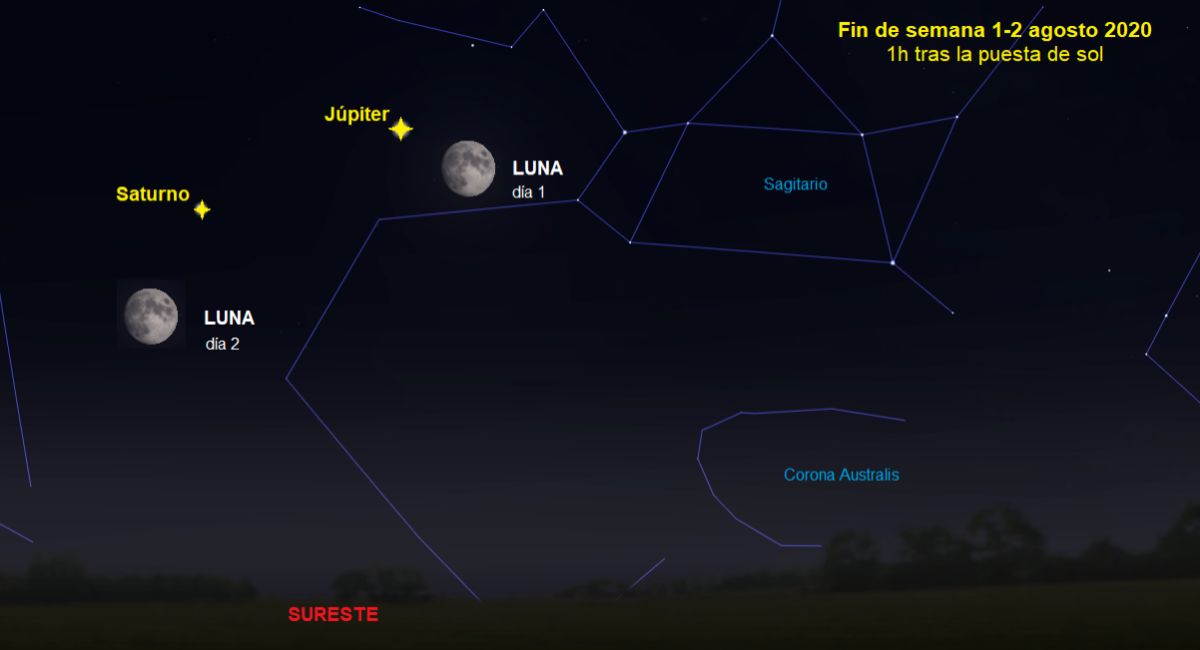- Date with the sky. Sunrises with all the planets
- Chronicles of the cosmos There are also dry seas and lakes on Titan, Saturn's largest moon
Let's enjoy the short and warm nights this weekend to observe the full moon that will form beautiful pictures with the giant planets Jupiter and Saturn.
Full moon
The second full moon of the summer will take place on Monday, August 3. That day our satellite will be perfectly aligned with the Earth and the Sun, but already during the weekend nights, the illumination of the lunar disk will be almost complete. On these summer days, the sun rises high above the horizon at solar noon. The moon, on the other hand, behaves exactly the opposite way, and remains relatively low throughout the night. This makes summer nights with full moon very attractive in places without light pollution , since the faint shadows caused by moonlight are particularly long, giving the landscape a peculiar aspect.
The full moon is a delight for walkers or joggers who, at this time of year, want some lighting while doing their exercises and night activities in the countryside, the beach, or the mountains.
However, the full moon is always a nuisance to astronomers, as its brightness makes observing any other star in the celestial vault more difficult than on moonless nights. Even to observe the Moon itself, the full moon is not recommended, since the frontal lighting does not make the details of the lunar relief clearly visible.
This full moon in August is known as the Grain Moon, or Green Corn Moon , in reference to the state of the crops. In North America it is also called the sturgeon moon, a name given by some tribes who love fishing for this great fish in rivers and large lakes, fishing that was carried out more easily at this time of year.
Along with Jupiter and Saturn
It is convenient to observe the Moon during the weekend from 10pm looking towards the southeast. The Sun will have hidden at about 9:30 pm, leaving all the prominence of the night to the gibbous moon, almost full. Saturday 1 will be closer to Jupiter and Sunday 2 closer to Saturn.
Both giant planets are now extremely bright, despite the fact that they are both very far from Earth: Jupiter 4.2 times and Saturn 9 times further than the Sun. Their intense brightness is due to the fact that, just like the Moon, both planets are in the opposite direction to the Sun. Jupiter was exactly in opposition on the 14th and Saturn on the 20th of last July. These are the best times, then, to observe the two giant planets . With a small telescope you can easily see its moons, the great spot of Jupiter and the rings of Saturn.
The Moon together with the two giant planets will form a trio of great beauty that will ascend in the sky throughout the night, to reach its maximum elevation, to the south, around 1:30 a.m., and to end up going to bed for the southwest at around 5am, shortly before sunlight begins to guess from the east.
Mars, Venus and the stars
During these same nights it will also be possible to observe the reddish Mars, which will rise in the east around midnight and will be close to its maximum elevation (that is, near the meridian, to the south) at dawn.
Venus, with its dazzling brilliance, will rise at around 4 o'clock and will also remain visible until dawn: a perfect morning star.
Let's take advantage of the warm atmosphere of these summer nights to look up at the sky and enjoy the show. Due to the full moon it will not be possible to see many stars, but it is always possible and comforting to recognize the Great Bear and the Summer Triangle (the asterism that has the brilliant Altair, Deneb and Vega as vertices) permanent witnesses of the beautiful summer nights in the northern hemisphere.
Rafael Bachiller is director of the National Astronomical Observatory (National Geographic Institute) and academic of the Royal Academy of Doctors of Spain.
According to the criteria of The Trust Project
Know more- science
- Science and health
ScienceThe first scientific robot arrives: "It is not just another machine in the laboratory, it is a new member of the team with superpowers"
EnvironmentRecycles, the system that rewards you for recycling beverage cans and bottles
SCIENTIALThe secret history of women who revolutionized medicine in the time of the plague
See links of interest
- News
- Translator
- Programming
- Calendar
- Horoscope
- Classification
- Films
- Cut notes
- Themes

